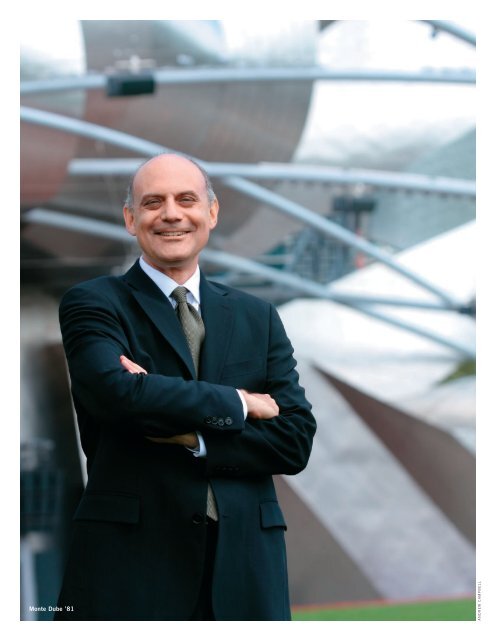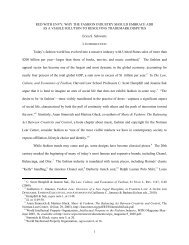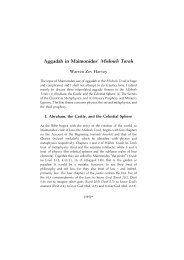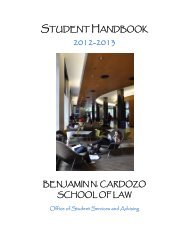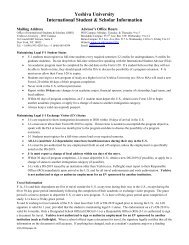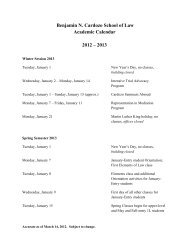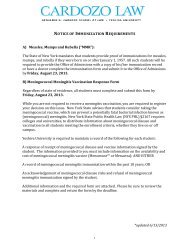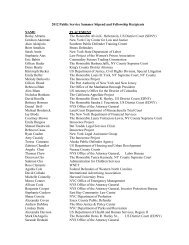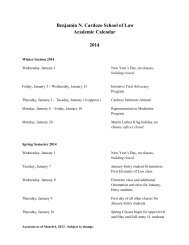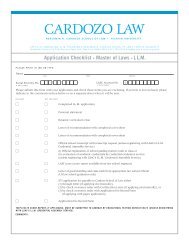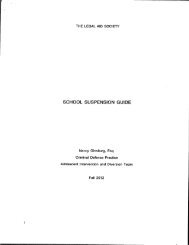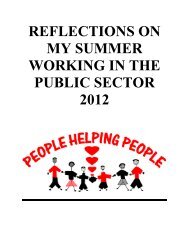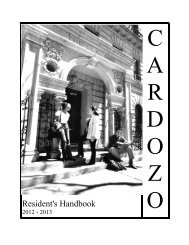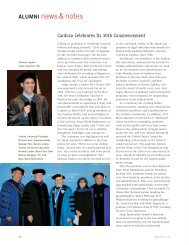Monte Dube '81 - Benjamin N. Cardozo School of Law
Monte Dube '81 - Benjamin N. Cardozo School of Law
Monte Dube '81 - Benjamin N. Cardozo School of Law
Create successful ePaper yourself
Turn your PDF publications into a flip-book with our unique Google optimized e-Paper software.
<strong>Monte</strong> <strong>Dube</strong> ’81<br />
ANDREW CAMPBELL
BY JANE LINKER<br />
A View from<br />
theTop<br />
Several <strong>Cardozo</strong> graduates—partners and associates—at some <strong>of</strong> the largest<br />
and most prestigious firms in the country recently spoke to us about largefirm<br />
practice. As a group, they share an enthusiam for their work, even<br />
when long hours are involved; they also give us insight into why <strong>Cardozo</strong><br />
does so well in the large-firm market.<br />
Asked how members <strong>of</strong> the <strong>Cardozo</strong> class <strong>of</strong> ’81—<br />
the third in the law school’s history—got jobs,<br />
<strong>Monte</strong> <strong>Dube</strong> laughs. “A combination <strong>of</strong> chutzpah<br />
and grit, I guess. There was very much<br />
a sense that we were pioneers, and that<br />
was exciting,” recalls <strong>Dube</strong>, a partner at<br />
McDermott Will & Emery LLP, based in<br />
Chicago. A nationally known specialist in health law, <strong>Dube</strong>,<br />
who joined the firm in 1984, headed McDermott’s health law<br />
department, the nation’s largest, from 2001 to 2006.<br />
<strong>Dube</strong>’s legal career started with a year as a Bigelow<br />
Teaching Fellow and lecturer in law at the University <strong>of</strong><br />
Chicago <strong>Law</strong> <strong>School</strong>. He’d been recommended for the prestigious<br />
fellowship by two <strong>of</strong> his <strong>Cardozo</strong> pr<strong>of</strong>essors, who had<br />
both taught at the University <strong>of</strong> Chicago.<br />
“I figured I’d spend a year teaching and then go back and<br />
conquer Wall Street, but in those days being a Bigelow<br />
Fellow didn’t make much <strong>of</strong> an impact in New York, though<br />
it did in Chicago,” he recalls.<br />
After two years at a litigation boutique in Chicago, <strong>Dube</strong><br />
decided to make a total career shift into health law. “The<br />
field was just beginning then. Now, health care is the most<br />
heavily regulated industry on the planet. You have to understand<br />
both the regulatory milieu and the reimbursement<br />
side to do deals in what is now a $2 trillion industry sector<br />
that includes everything from hospitals to insurance behemoths<br />
to medical device manufacturers.”<br />
When <strong>Dube</strong> joined McDermott, he was the 12th lawyer in<br />
the health law department. Today, its 90 lawyers include<br />
three health attorneys in Munich, with more to come in<br />
London and elsewhere. In the last 25 years, he has served as<br />
counsel in the sale, merger, affiliation, and acquisition <strong>of</strong><br />
hundreds <strong>of</strong> hospitals and academic medical centers, hospital<br />
corporate restructurings, public-hospital privatizations,<br />
hospital-physician joint ventures, reimbursement and regulatory<br />
compliance and litigation, and hospital and medical<br />
staff operational legal issues <strong>of</strong> all types. Ranked as a leading<br />
lawyer in health care law in Chambers USA: America’s Lead -
ing <strong>Law</strong>yers for Business, <strong>Dube</strong> frequently lectures in Amer -<br />
ica and abroad.<br />
“We’re exporting our expertise to Europe, the Middle<br />
East, and Latin America, working with all kinds <strong>of</strong> health<br />
care providers,” <strong>Dube</strong> points out. “I’m fortunate to represent<br />
one <strong>of</strong> Israel’s largest health insurers, as well as Dubai<br />
Health Care City, a free-trade zone where they’re building a<br />
mega-health center that will be a magnet for the Middle East<br />
and Africa. American providers like Harvard Medical and<br />
the Cleveland Clinic are creating satellites there. It’s a whole<br />
new health care universe.”<br />
<strong>Dube</strong> admits that while McDermott doesn’t actively<br />
recruit from <strong>Cardozo</strong>, there are eight <strong>Cardozo</strong> grads currently<br />
at McDermott, including Daniel Mullen ’94, a partner in<br />
Washington.<br />
<strong>Dube</strong>, who lives in Evanston with his wife, Lori, and<br />
three teenaged kids, wanted the advantages he felt a large<br />
international firm would provide. “A large firm gives you<br />
great exposure and diversity <strong>of</strong> opportunities: you see every<br />
imaginable type <strong>of</strong> legal and business issue, and there are<br />
extensive networking opportunities. You also have a bigger<br />
pool <strong>of</strong> potential mentors,” he points out. “It takes more<br />
effort in a big firm to find the work/life balance. It’s not for<br />
everybody, but for me, even after more than two decades,<br />
doing what I love, working with brilliant colleagues, and<br />
being well paid for it, that’s an easy decision.”<br />
W NORMAN<br />
hen Harold Gordon ’88 graduated,<br />
getting into the top law firms was<br />
still difficult for <strong>Cardozo</strong> graduates,<br />
but Gordon has seen that change<br />
dramatically at Jones Day.<br />
“In the mid-1990s, I arranged a<br />
lunch at the Gotham Bar & Grill, a<br />
Car dozo neighborhood favorite, with the Jones Day New<br />
York recruiting partner and Dean Frank Macchiarola and<br />
Associate Dean Ellen Cherrick. I always say it just took a<br />
good tuna burger and chardonnay to get Jones Day to participate<br />
in <strong>Cardozo</strong> on-campus recruiting. The rest is history,”<br />
says Gordon. “<strong>Cardozo</strong> students became standouts in the<br />
Jones Day summer classes, generating <strong>of</strong>fice-wide enthusiasm<br />
for more <strong>Cardozo</strong> students, who got hired full time and<br />
moved up. Today we have about 20 <strong>Cardozo</strong> alums, including<br />
at least three partners.”<br />
Gordon—the second <strong>Cardozo</strong> graduate hired by Jones<br />
Day—actively recruits at the <strong>Law</strong> <strong>School</strong>, organizing and<br />
doing on-campus interviews every year. Though he points<br />
out that the firm looks primarily at or near the top <strong>of</strong> the<br />
class, there is flexibility because <strong>Cardozo</strong> students have<br />
become a known quantity.<br />
“Sometimes a resume just jumps out even if a student is<br />
not in the top 10 to 15 percent <strong>of</strong> her class because <strong>of</strong> impressive<br />
pre–law school work, for example, and we’ll look at the<br />
applicant. Grades are not our sole focus.”<br />
Gordon himself chose government service when he graduated<br />
from law school. He served as a staff attorney and<br />
then a branch chief in the division <strong>of</strong> enforcement at the<br />
Securities and Exchange Commission. He also clerked for<br />
Judge Lowell A. Reed, Jr., US District Court, Eastern District<br />
<strong>of</strong> Pennsylvania.<br />
“The right government position can get you more litigation<br />
experience faster than you would encounter at a large<br />
law firm. Starting at the SEC was a good initial career position<br />
for me,” says Gordon.<br />
When he finished his clerkship, Gordon picked Jones<br />
Day from several options and made partner in 2000, specializing<br />
in corporate and commercial litigation and product liability.<br />
A large part <strong>of</strong> his practice also involves counseling<br />
clients involved with investigations and enforcement proceedings<br />
pursued by the SEC, the Department <strong>of</strong> Justice,<br />
state securities regulators, and the securities industry selfregulatory<br />
organizations.<br />
For him, the benefits <strong>of</strong> a large firm were the deciding<br />
factor. “A large firm at the formative stages <strong>of</strong> your career<br />
can give you excellent training in multiple departments, and<br />
you’re exposed to complex legal matters. There are also<br />
attorneys in many different practice areas and at different<br />
levels you can turn to for advice, not unlike the atmosphere<br />
at a teaching hospital.”<br />
Gordon has had extensive experience assisting clients in<br />
44 CARDOZO LIFE<br />
GOLDBERG<br />
Harold Gordon ’88
NORMAN GOLDBERG<br />
“<strong>Cardozo</strong> students became standouts in the Jones Day summer classes,<br />
generating <strong>of</strong>fice-wide enthusiasm for more <strong>Cardozo</strong> students.”<br />
—HAROLD GORDON<br />
multiple SEC investigations and other matters, including<br />
class actions in state and federal court. His clients in recent<br />
matters have included Symbol Technologies, Verint<br />
Systems, Mitsubishi Corporation, and the R. J. Reynolds<br />
Tobacco Company.<br />
“Representing R. J. Reynolds gave me the opportunity to<br />
take lead roles in multiple high-pr<strong>of</strong>ile jury trials in New<br />
York and elsewhere, an unusual experience for many bigfirm<br />
litigators. Doing those trials provided invaluable pr<strong>of</strong>essional<br />
experience that’s readily transferable to all other<br />
types <strong>of</strong> cases. In certain respects, it’s not until you try a<br />
case that you really learn how to work up a case before trial.”<br />
Gordon, who met his wife, <strong>Cardozo</strong> graduate Carrie<br />
Kolinsky ’88, during his first year at <strong>Cardozo</strong>, is well aware<br />
<strong>of</strong> the work schedule that being a partner in a major New<br />
York law firm entails. He has two daughters, one <strong>of</strong> whom is<br />
starting at the age <strong>of</strong> 13 to talk about becoming a lawyer.<br />
“<strong>Law</strong> is probably one <strong>of</strong> the most laborious ways to make<br />
a living. It’s very intense and doing it well can easily consume<br />
10 to 12 hours a day and sometimes more. We’re also<br />
a client-service industry and you have to accept the relentless<br />
nature <strong>of</strong> client demands. I don’t think this necessarily<br />
differs depending on where you practice—I’m sure lawyers<br />
in boutique firms and solo practitioners work as many hours<br />
as I do. It’s the inherent nature <strong>of</strong> what we do and what it<br />
takes to be a good lawyer.”<br />
Shai Waisman ’96 admits that there isn’t a day<br />
he doesn’t pay attention to work. But to him,<br />
that’s just the nature <strong>of</strong> being at a large<br />
international law firm like Weil, Gotshal &<br />
Manges LLP.<br />
Waisman recruits for the firm around the<br />
country and says he is always asked about<br />
the hours. “I tell them if you love what you do, you don’t<br />
work a day in your life.”<br />
Waisman became a partner at Weil in January 2004 in<br />
business finance and restructuring, having made a lateral<br />
move from another firm his first year out <strong>of</strong> <strong>Cardozo</strong> be -<br />
cause he wanted to concentrate on restructuring and Weil is<br />
the acknowledged leader in the field. “Weil really created the<br />
field and we’ve handled every major matter, including<br />
Enron and WorldCom.”<br />
Waisman himself has worked with a range <strong>of</strong> major corporate<br />
clients, including American Airlines (he represented<br />
American when it bought TWA), Reuters, Loral Space &<br />
Communications, and the major Chapter 11 <strong>of</strong> its day,<br />
Global Crossing. Named “Outstanding Young Restructuring<br />
<strong>Law</strong>yer” by Turnarounds and Workouts in 2006, he is currently<br />
involved in restructuring the 276-store apparel chain<br />
Steve & Barry’s.<br />
Increasingly, he finds himself traveling around the world,<br />
as restructuring becomes a global business. Recent overseas<br />
Shai Waisman ’96
ENRIQUE CUBILLO<br />
business trips have been to London, Paris, and even China,<br />
accompanied by representatives <strong>of</strong> the US State Depart -<br />
ment. He has worked in a wide variety <strong>of</strong> industries, representing<br />
purchasers and sellers <strong>of</strong> assets in complex multinational<br />
restructurings. He feels the international nature <strong>of</strong><br />
the field has added a whole new dimension to his practice.<br />
Over the past decade, Weil has hired more <strong>Cardozo</strong> graduates<br />
than any other top firm, contends Waisman, and the<br />
numbers back him up. Currently there are more than 30<br />
<strong>Cardozo</strong> alums working at Weil, and some years the number<br />
has been as high as 50. There are now four <strong>Cardozo</strong> partners<br />
at the firm, including three in bankruptcy.<br />
“When I started, <strong>Cardozo</strong> was a relatively new addition to<br />
the schools where Weil hired. Basically, it’s come down to<br />
the performance <strong>of</strong> the students we get. The attorneys here<br />
saw the caliber <strong>of</strong> the product <strong>Cardozo</strong> was turning out:<br />
they’re educated, hungry, and very impressive.”<br />
During college—he earned a B.A. from American Uni -<br />
versity—Waisman worked in the public defender’s <strong>of</strong>fice and<br />
in speechwriting at the Clinton White House. Torn between<br />
law and politics, he reasoned that “politics would always be<br />
there” but the time for a law degree was now.<br />
Coming to <strong>Cardozo</strong> was the result <strong>of</strong> a rather unusual<br />
encounter. “My dad was c<strong>of</strong>ounder <strong>of</strong> a printing business in<br />
Queens, where I worked growing up. He’d printed some<br />
campaign materials for Frank Macchiarola when he ran for<br />
comptroller. When I decided to apply to <strong>Cardozo</strong>, Dad called<br />
a friend who’d worked on the campaign to see if anyone<br />
could <strong>of</strong>fer advice about the school. A few days later I got a<br />
call in Washington from Dean Macchiarola’s <strong>of</strong>fice to come<br />
to New York to interview with him. That visit made all the<br />
difference. I got to see firsthand the fantastic combination <strong>of</strong><br />
enthusiasm, community spirit, and scholarship that sets<br />
<strong>Cardozo</strong> apart. Dean Macchiarola was a tremendous mentor<br />
to many students, and I was very fortunate to have the<br />
opportunity to have him as a pr<strong>of</strong>essor and to work as his<br />
research and teaching assistant throughout law school. It<br />
Julian S. H. Chung ’95<br />
“ Every lawyer has to create<br />
a work/life balance that fits.<br />
Not every practice lends<br />
itself to flexibility, though<br />
some areas <strong>of</strong> law are more<br />
predictable than others.”<br />
—JULIAN CHUNG<br />
came full circle for me when I spoke at commencement and<br />
was able to publicly thank Dean Macchiarola, who was retiring,<br />
for what he did for so many <strong>of</strong> us.”<br />
Waisman and his wife, Kate, travel extensively and are<br />
involved in numerous causes and philanthropies, including<br />
<strong>Cardozo</strong> and the Bank Street College <strong>of</strong> Education, where<br />
they have endowed the Waisman Family Scholarship. In the<br />
little spare time he has, Waisman trains for and runs in<br />
marathons. He’s successfully run the New York race three<br />
times, as well as ones in Philadelphia and London.<br />
“When I joined Weil, my plan was to work here for a few<br />
years, and then move on, but I was having so much fun I forgot<br />
to leave!”<br />
Julian S. H. Chung ’95 is very familiar with how<br />
large law firms operate. She spent 10 years at<br />
Simpson Thacher & Bartlett LLP in its corporate<br />
department before joining Cadwalader<br />
Wickersham & Taft LLP in 2005 as special counsel.<br />
She was made a partner a year later. She’s<br />
the only <strong>Cardozo</strong> partner at Cadwalader,<br />
though there are more than a dozen <strong>Cardozo</strong> associates currently<br />
working there. Chung’s principal practice involves<br />
the representation <strong>of</strong> large financial institutions in commercial<br />
lending transactions, with an emphasis on senior<br />
secured finance for leveraged acquisitions, primarily representing<br />
the lead agents and arrangers. Lehman Brothers is a<br />
client and she has worked with JPMorgan Chase, Bear<br />
Stearns, and Barclays. She recently represented the lead<br />
banks for a portion <strong>of</strong> the financing for the going-private <strong>of</strong><br />
Archstone.<br />
To Chung, the workload issue is not about the firm—it’s<br />
about the deals. “At any given time, I can be working on<br />
eight different things. As you become more experienced,<br />
you become more adept at estimating how long things take.<br />
Then you triple it because you’re never totally sure what’s<br />
going to happen,” she laughs. “At any top law firm, it’s a<br />
46 CARDOZO LIFE
given that you will be available when you’re needed and<br />
responsive to what your clients want. That holds true<br />
whether you’re an associate or a partner.”<br />
Chung grew up in Hawaii. Before graduating from New<br />
York University, she spent several years working as a fashion<br />
photographer in New York, eventually moving to the<br />
business side, representing other photographers. Interested<br />
in the entertainment industry, she figured a good way in<br />
was through law, and applied to <strong>Cardozo</strong> because <strong>of</strong> the<br />
<strong>School</strong>’s strong program. During her second year in law<br />
school, a friend arranged an interview with a partner in an<br />
entertainment law firm.<br />
“There was a very small entertainment law community<br />
in New York at that time, and for the most part they didn’t<br />
hire right out <strong>of</strong> law school. I was advised to get some ‘big<br />
law’ experience and come back in a few years. I joined<br />
Simpson and found the corporate work I was doing really<br />
interesting and my career focused on that.”<br />
When Chung was a summer associate at Simpson, it had<br />
a single corporate pool. When she arrived as a first-year<br />
associate, the firm was just developing a rotation system and<br />
she started in the finance group. Her second year was spent<br />
in capital markets, and as a third-year she was <strong>of</strong>fered the<br />
opportunity to split her time between the two groups. Since<br />
then her practice has focused on bank financing.<br />
Chung lives in Union Square with her two sons, seven and<br />
nine, and her husband, a network engineer. Her typical day<br />
runs about 10 hours and her free time “is spent with my kids.”<br />
The only photography she does now is on family vacations.<br />
“Every lawyer has to create a work/life balance that fits.<br />
Not every practice lends itself to flexibility, though some<br />
areas <strong>of</strong> law are more predictable than others. For example,<br />
Vered Rabia ’98<br />
practice areas which don’t have such stringent deadlines, or<br />
where a great deal <strong>of</strong> what a lawyer does is reviewing regulations,<br />
can be more amenable to regular hours.”<br />
B<br />
orn in Miami, raised in Israel, Vered Rabia<br />
’98 chose to be a summer associate at<br />
Skadden, Arps, Slate, Meagher & Flom in<br />
1997 because the firm did a lot <strong>of</strong> work with<br />
Israeli companies and that was where she<br />
hoped to focus her career. She spent two<br />
years in the Israeli Air Force before college.<br />
It didn’t quite work out that way. Ten years later, Rabia’s<br />
varied real estate practice includes clients such as Alex -<br />
andria Real Estate, the developer <strong>of</strong> the East River Science<br />
Park, the first bioscience project in New York City; Bank <strong>of</strong><br />
America in the acquisition and development <strong>of</strong> its new<br />
Times Square headquarters; Madison Square Garden; and<br />
Apollo Real Estate. She does have a few Israeli clients and<br />
visits Israel every year.<br />
Initially undecided between business and law, Rabia, who<br />
spent a year at Bear Stearns after college, chose law school<br />
because she felt that a legal education would serve her well<br />
no matter which direction she took.<br />
Skadden does a traditional six-month rotation for its associates,<br />
but because Rabia graduated from <strong>Cardozo</strong> in<br />
December, she started six months before the rest <strong>of</strong> her<br />
class. Skadden agreed that she could use that extra six<br />
months to stay in real estate for a year before she began the<br />
rotatation.<br />
“Six months isn’t really enough time to get the feel <strong>of</strong> a<br />
real estate practice because deals can <strong>of</strong>ten take much<br />
longer than that to evolve,” she points out. “After a year, I<br />
loved what I was doing so<br />
much, I’ve never left.”<br />
Rabia is active in all areas <strong>of</strong><br />
the firm’s real estate practice.<br />
She’s represented clients in<br />
connection with acquisition,<br />
financing, development, and<br />
disposition <strong>of</strong> <strong>of</strong>fice buildings,<br />
hotels, and residential developments.<br />
Increasingly, her work<br />
is international. In the past<br />
year, she closed a deal on a<br />
joint venture in Macao that<br />
combined a casino with a retail<br />
operation. That meant several<br />
trips to China, no hardship for<br />
Vered, who loves to travel and<br />
chooses the most exotic locations<br />
she can find for vacations.<br />
She works a lot with hotel<br />
developers and operators—Ian<br />
Schrager, Orient Express, and<br />
Andre Balazs are all clients—<br />
and is involved in acquisition,<br />
development, and financing <strong>of</strong><br />
ENRIQUE CUBILLO<br />
47
their projects. Hotels are an<br />
area she’s especially familiar<br />
with: during college, she<br />
worked at both the Barbizon<br />
and the Plaza, starting on the<br />
reception desk and ending up<br />
as front-<strong>of</strong>fice manager.<br />
Rabia estimates that there<br />
are about 15 <strong>Cardozo</strong> graduates<br />
working at Skadden. Many<br />
more have been hired over the<br />
years, but she points out that<br />
some people have stayed only<br />
three or four years and then<br />
moved on, <strong>of</strong>ten to a client.<br />
“It takes time for a school to<br />
build a reputation, for graduates<br />
to come into the firm and<br />
perform well. <strong>Cardozo</strong> has<br />
always had an exceptional fac-<br />
Sarah Jones ’02<br />
ulty, and that’s becoming increasingly well known.”<br />
Asked about the Skadden reputation for working long<br />
hours, Rabia laughs. “That’s silly. Many <strong>of</strong> my friends who<br />
work at midsize firms put in just as many hours as I do. With<br />
clients, you have to be available when they need you. Sure,<br />
I’ve had to cancel plans, but that comes with the territory.<br />
The benefits <strong>of</strong> working at Skadden—recognition, reputation,<br />
and experience—far outweigh the deficits. I love the<br />
people I work with. I went with my initial gut reaction and<br />
I was right.”<br />
D<br />
uring her second year at law school, Sarah<br />
Jones ’02 looked at some midsize firms but<br />
decided they didn’t <strong>of</strong>fer what she wanted.<br />
“I quickly found out that a larger firm has<br />
resources that can make a significant difference<br />
for a new lawyer. There are more<br />
lawyers you can draw from, for example,”<br />
says Jones. “If you know which area you want to specialize<br />
in, a small firm can be the right choice, but if you’re undecided,<br />
I’d say go with a large firm if you can.”<br />
Ranked first in her class, Order <strong>of</strong> the Coif, and a supervising<br />
editor <strong>of</strong> <strong>Cardozo</strong> <strong>Law</strong> Review, Jones was the first<br />
<strong>Cardozo</strong> summer associate hired by Cravath, Swaine &<br />
Moore LLP in several years. The firm began recruiting on<br />
campus in 1999 and now averages at least one summer associate<br />
a year.<br />
“Cravath is known for giving its summer associates real<br />
work,” recalls Jones, who was assigned to a partner in commercial<br />
banking. “They also have a very specific rotation for<br />
their associates. It’s called the Cravath system: you switch<br />
about every 18 months, and if you don’t want it, you shouldn’t<br />
come here. It’s a good system because you have the<br />
opportunity to focus on different areas, and you get to work<br />
with a lot <strong>of</strong> different partners. It also makes you more versatile<br />
as a corporate lawyer.”<br />
Now in her fifth Cravath rotation, Jones does a range <strong>of</strong><br />
NORMAN GOLDBERG<br />
“ My hours vary each day,<br />
week, and month…<br />
Things come up and you<br />
have to be ready to<br />
handle them. That’s just<br />
the way it is.”<br />
—SARAH JONES<br />
corporate work, including mergers and acquisitions, corporate<br />
advising, private equity, and venture capital. Through<br />
her prior rotations, she’s had experience in commercial<br />
banking, M&A, and securities. She’s done IPOs, representing<br />
issuers and underwriters; syndicated bank transactions, representing<br />
borrowers and lenders; public and private <strong>of</strong>ferings<br />
<strong>of</strong> debt and equity securities; and 1934 Act filing and<br />
Sarbanes-Oxley compliance advising.<br />
Her clients have included most <strong>of</strong> the major New York<br />
investment banks and several top corporations. Involved in<br />
a variety <strong>of</strong> corporate deals over the past five years, Jones<br />
has participated in representations <strong>of</strong> the lead underwriters<br />
in initial public <strong>of</strong>ferings for a manufacturing company and<br />
a technology company, a major international corporation in<br />
the sale <strong>of</strong> a division to a Chinese buyer, and a pharmaceutical<br />
company in financing for an acquisition and subsequent<br />
public <strong>of</strong>ferings <strong>of</strong> common and preferred stock.<br />
In 1999, Jones, who grew up in Fredericksburg, Virginia,<br />
and got her B.A. from James Madison University as a music<br />
business major, traded in her car, put down her clarinet, and<br />
headed for Manhattan and <strong>Cardozo</strong>. “Now I just try to keep<br />
up a subscription to the Philharmonic,” she jokes.<br />
Like every other associate in a top firm, Jones has also<br />
had to learn how to manage her time and create a life outside<br />
<strong>of</strong> work. She’s found that living within walking distance<br />
<strong>of</strong> the <strong>of</strong>fice actually means she spends less time at work.<br />
For the past two years, she’s taken her monthlong vacation<br />
in one stretch, finding that she comes back to the <strong>of</strong>fice rested<br />
and recharged.<br />
“My hours vary each day, week, and month. To work in a<br />
firm like Cravath—and I imagine any other major firm—you<br />
have to realize that you can’t plan on a predictable level <strong>of</strong><br />
work. Things come up and you have to be ready to handle<br />
them. That’s just the way it is. It does become a little easier<br />
as you get more experienced and better at managing your<br />
time. Still, a senior partner will have to be prepared to take<br />
a 1:00 a.m. phone call from time to time, just like I do.”<br />
48 CARDOZO LIFE
When she interviewed with Cleary<br />
Gottlieb Steen & Hamilton LLP<br />
for a summer associate slot, one <strong>of</strong><br />
the attributes that appealed most to<br />
Davida Williams ’03 was the firm’s<br />
strong international presence. Little<br />
did she know that three years later,<br />
when her new husband, Joseph Knoll, got a job <strong>of</strong>fer in<br />
London, that international aspect—Cleary has a dozen<br />
<strong>of</strong>fices worldwide, with about 70 lawyers in London—would<br />
become critical to her own career.<br />
“I loved the New York <strong>of</strong>fice, but working and living in<br />
London has been really interesting. In New York, I was in<br />
litigation; here I’m mainly focused on corporate work, primarily<br />
doing IPOs and some equity <strong>of</strong>ferings,” she ex -<br />
plained. “In New York, travel for work is limited and not particularly<br />
exotic. In London, I’ve traveled all over Europe.”<br />
Since moving to London in September<br />
2006, Williams has done an IPO and privatization<br />
<strong>of</strong> a bank in Pakistan, and worked on deals<br />
in South Africa, Slovenia, Latvia, the Nether -<br />
lands, and Ireland. She has represented corporations<br />
and investment banks in connection<br />
with corporate restructurings as well as public<br />
and private debt and equity <strong>of</strong>ferings.<br />
Williams joined Cleary as a litigator and<br />
spent her first two years as part <strong>of</strong> the team<br />
that worked on the Oracle-PeopleS<strong>of</strong>t transaction,<br />
a case, she proudly points out, now<br />
taught in law schools. “It was an amazing experience<br />
for a new associate. We were four partners<br />
and five associates, <strong>of</strong>ten working around<br />
the clock. <strong>Law</strong> school can prepare you, but<br />
until you are actually in practice, you don’t<br />
really know what it’s like,” she points out. “I<br />
chose a large firm because I wasn’t 100 percent<br />
sure <strong>of</strong> which area <strong>of</strong> law I wanted to focus on,<br />
but I wanted to be in a place where I could<br />
explore, that would give me good experience,<br />
and where I could do some pro bono work.<br />
Cleary absolutely has fit all these criteria.”<br />
Williams, a graduate <strong>of</strong> the University <strong>of</strong><br />
Penn syl va nia, looked at a number <strong>of</strong> East<br />
Coast law schools but chose <strong>Cardozo</strong> because<br />
she was impressed by the alternative dispute<br />
resolution program. She participated in the<br />
school’s Mediation Clinic, where students are<br />
trained to mediate at community dispute resolution<br />
centers, small claims court, and civil<br />
court. Articles editor <strong>of</strong> the Car dozo <strong>Law</strong><br />
Review, Williams was a judicial intern for<br />
Judge Alvin Hellerstein, US District Court,<br />
Southern District.<br />
“The <strong>Cardozo</strong> placement resources were<br />
extremely effective. Before the interviewing<br />
process, I had two rounds <strong>of</strong> mock interviews<br />
and my résumé was vetted by a number <strong>of</strong><br />
2008 ISSUE 2<br />
MARK TURNBULL<br />
people. <strong>Cardozo</strong> really prepared me, which was very lucky<br />
since my first interview was actually with Cleary!”<br />
Now a fifth-year associate, Williams proudly points to a<br />
strong <strong>Cardozo</strong> presence at Cleary. The firm actively re -<br />
cruits on campus. Three graduates joined the firm the year<br />
she joined, and all are still there. <strong>Cardozo</strong> alumni at Cleary<br />
have donated two seats to the <strong>School</strong>’s Moot Court Room,<br />
and Williams herself has contributed six more. As a new<br />
mother—Williams gave birth to her first child at the end <strong>of</strong><br />
August, one day after she posed for the portrait shown<br />
here—she is aware <strong>of</strong> what she terms Cleary’s excellent<br />
maternity policy.<br />
“At Cleary, they hire you because you’re passionate about<br />
your work. I’ve found the Cleary culture to be a very open<br />
environment, very collegial. It’s one <strong>of</strong> the few firms that’s<br />
still ‘lockstep’ through partnership. For me, it’s been everything<br />
I had hoped for.” <br />
Davida Williams ’03


